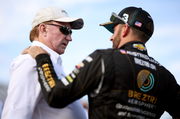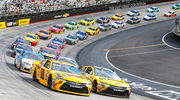
via Imago
Nov 9, 2024; Avondale, Arizona, USA; 23XI Racing team owner Michael Jordan during qualifying for the Cup Series championship race at Phoenix Raceway. Mandatory Credit: Gary A. Vasquez-Imagn Images

via Imago
Nov 9, 2024; Avondale, Arizona, USA; 23XI Racing team owner Michael Jordan during qualifying for the Cup Series championship race at Phoenix Raceway. Mandatory Credit: Gary A. Vasquez-Imagn Images
“I love the sport of racing and the passion of our fans, but the way NASCAR is run today is unfair to teams, drivers, sponsors, and fans,” said Michael Jordan, co-owner of 23XI Racing. With that statement, the basketball legend didn’t just raise eyebrows. He raised the stakes in one of NASCAR’s most heated legal battles – The NASCAR Anti-trust Lawsuit. Alongside Front Row Motorsports, Jordan’s team is challenging the NASCAR governing body’s grip on the sport, accusing the organization and its CEO, Jim France, of monopolistic practices.
The lawsuit aims to expose how the current system sidelines teams from real decision-making power and limits their financial share. But here’s where it gets even more intriguing. Jordan’s legal team isn’t stopping at NASCAR. To prove the point they are making, they’re now looking to Formula 1 for answers.
ADVERTISEMENT
Article continues below this ad
Will it be a brawl or an expose?
Michael Jordan’s 23XI Racing and Front Row Motorsports are doubling down in their lawsuit against NASCAR. As part of their latest motion, the teams have asked Formula 1’s parent company, Liberty Media, to share key financial data. “Their most recent motion asks Liberty Media for five key pieces of information,” Estepp explained. These include documents sufficient to show revenues, team revenue splits, and valuations of current and expansion teams.
Their goal? To compare how F1 distributes profits and gives teams influence versus how NASCAR operates under its Charter Agreement. In F1, teams receive 45% of the prize pot and bonuses, totaling up to 60% of profits. Formula 1 reported $3.65 billion in revenue for 2024, up 13% from 2023. The main sources of revenue came from media rights (32.8%), race promotion (29.3%), and sponsorship (18.6%). However, “Compare that to NASCAR, under the new charter agreement, supposedly teams get nearly 50% of the media revenue, which is NASCAR’s largest income stream.” There is no split in other revenue streams.
Moreover, as per the Concorde Agreement, there is a budget cap that F1 teams need to strictly adhere to. Remember the Red Bull budget cap breach? As Estepp pointed out, “A big difference, though, between F1 and NASCAR is that the Concord agreement implements a spending cap.” There is a budget of $135 million per team per year, and the agreement offers teams a seat at the table. NASCAR, in comparison, has no cost cap and limited team input on decisions.
That’s exactly what 23XI and others are challenging. They argue that NASCAR’s system is monopolistic, leaving teams financially vulnerable and powerless. But, “NASCAR has brought the idea of a cost cap to their teams in recent years but have faced quite a bit of push back,” Estepp highlighted. As a result, they’re turning to F1’s more transparent model to illustrate how things could be better. Their expert witnesses aim to show what NASCAR teams might have earned in a fairer system.
By comparing the two structures, 23XI Racing hopes to make the case for a modernized business model, one where teams aren’t just participants but stakeholders. And if Liberty Media shares the requested documents, the ripple effects could be massive, not just for NASCAR, but for American motorsports as a whole. But we all know NASCAR. The legacy sports franchise will not let it go without a fight! They condemned the initial injunction anyways.
Trending
What’s your perspective on:
Is Michael Jordan the hero NASCAR needs to break free from its monopolistic chains?
Have an interesting take?
ADVERTISEMENT
Article continues below this ad
NASCAR slams injunction ruling
NASCAR has strongly opposed a preliminary injunction ruling in an antitrust lawsuit brought by 23XI Racing and Front Row Motorsports. The injunctions, granted by U.S. District Judge Kenneth Bell, bind the teams to NASCAR’s 2024 charter agreement despite their claims that the system violates antitrust laws. NASCAR has filed an appeal urging the U.S. Court of Appeals for the Fourth Circuit to reverse the decision, arguing that the judge misapplied antitrust laws.
In its appeal, NASCAR contends that Judge Bell incorrectly characterized the release of claims as standard business practice rather than anti-competitive conduct. NASCAR defended its position by citing case law, emphasizing that businesses have the right to set terms and conditions for agreements. It argued that teams voluntarily choose whether to accept or reject these terms, making the charter system legally valid.
NASCAR also defended its use of limited non-compete clauses and exclusivity agreements with racetracks, asserting that these practices are integral to its business model. According to NASCAR, such agreements ensure stability in operations and maintain competitive fairness across the sport. The organization believes these practices are consistent with standard industry norms and do not violate antitrust regulations.
ADVERTISEMENT
Article continues below this ad
The lawsuit underscores growing tensions between NASCAR and its teams over the charter system’s financial implications. Teams like 23XI Racing and Front Row Motorsports argue that the system creates barriers for smaller organizations. NASCAR maintains that it provides long-term value and stability for team owners.
As the legal battle unfolds, the outcome could have significant implications for NASCAR’s charter system and broader business practices. Will the appeals court side with NASCAR or uphold the injunctions? The decision could reshape team-owner dynamics in one of motorsports’ most lucrative leagues.
ADVERTISEMENT
ADVERTISEMENT
ADVERTISEMENT
ADVERTISEMENT







Is Michael Jordan the hero NASCAR needs to break free from its monopolistic chains?